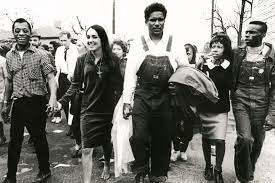Joan Baez wrapped up her 60 year career as a folk music icon and very public global civil rights activist with a 2019 show in Madrid, an exclamation point at the end of decades of thrilling, often landmark performances, protests and outspoken activism.
Her unmistakable soprano voice ringing clear and true, even as it aged, covering classic folk tunes and songs of her own creation, was always a clarion call for justice.
Now 82, she’s already been lauded and given her due as a legend, an “American Master,” as PBS labeled her.
“Joan Baez: I Am a Noise” is a more intimate look inward at a life in the public eye, famous from her teens, a Time Magazine cover at 21, respected and controversial from the beginnings of her public life to the end of it.
Three directors use lengthy conversations with Joan, her now-passed sister Pauline and mother “Joan Sr.,” archival interviews, readings from childhood essays and life journals, taped letters from the road and even cassette recordings of therapy sessions to paint a deeper portrait of a complex woman with so many layers to her no single film could do her justice.
A Mexican-American (her father was a preacher-turned physicist and UNESCO researcher) who experienced discrimination in childhood until she picked up first a ukulele and then a guitar, Baez was “running around barefoot, long-haired, looking like the Virgin Mary and probably thinking I was a little bit like her” in her youth,
But as her family became Quakers and she witnessed poverty in America and around the world, thanks to her father moving them to assorted Third World countries working for UNESCO, she noted in a teen essay, “I am not a saint. I am a noise.”
Interviewers like Christiane Amanpour might hail “one of the purest notes in music history,” but Baez sees herself, in reflection, as “just the right voice at the right time.”
“I Am a Noise” uses some childhood reenactments to recreate that childhood, and snippets of animation to provide visuals for the vast archives of audio recordings of her tape-recorder-mad father, her own taped letters and reflections.
We see performances from the last stretches of the tour she didn’t want to call “a farewell,” with her small band — son Gabriel Harris was her percussionist — and the film uses snippets of those shows and samples her scores classic live performances over the decades.
She revisits her brief, youthful and celebrated affair with Bob Dylan and her role in legitimizing his career and songwriting. We see their soulful and sometimes playful joint stage appearances, and note how her rural New York home is still decorated with images of Bob.
It’s a somewhat sprawling and almost ungainly film, years in the making, very revealing and yet notably incomplete. The great love affairs — male and female — leave off Apple founder Steve Jobs, and the weight of late life allegations of abuse by their father, which Baez and her folk-singing younger sister Mimi Fariña made, necessarily burdens the movie’s third act.
The focus is narrowly on Joan and her family, with only rare outside voices of authority glimpsed in archival interviews placing Baez on the pedestal music and cultural history built for her.
But her reflections on a life lived in the public eye are insightful and her memories of the many landmark civil rights events she participated in and help popularize an invaluable record of her era.
When folk singer and actor Theodore Bikel (“The African Queen,” “The Defiant Ones”) introduced Baez onto the stage at the 1960 Newport Folk Festival, his few simple words set up all the acclaim that her later life would live up to.
It was a rare thing, Bikel noted, to have a “great singer and musician” wrapped up in someone who is also “a great human being.”
Rating: unrated, drug content, abuse discussions, some profanity
Cast: Joan Baez, Pauline Baez, Gabriel Harris, Joan Baez Sr., with archival interviews/etc. with Bob Dylan, Mimi Fariña, Richard Fariña and David Harris
Credits: Directed by Mira Navazsky, Maeve O’Boyle and Karen O’Connor. A Magnolia release.
Running time: 1:53





